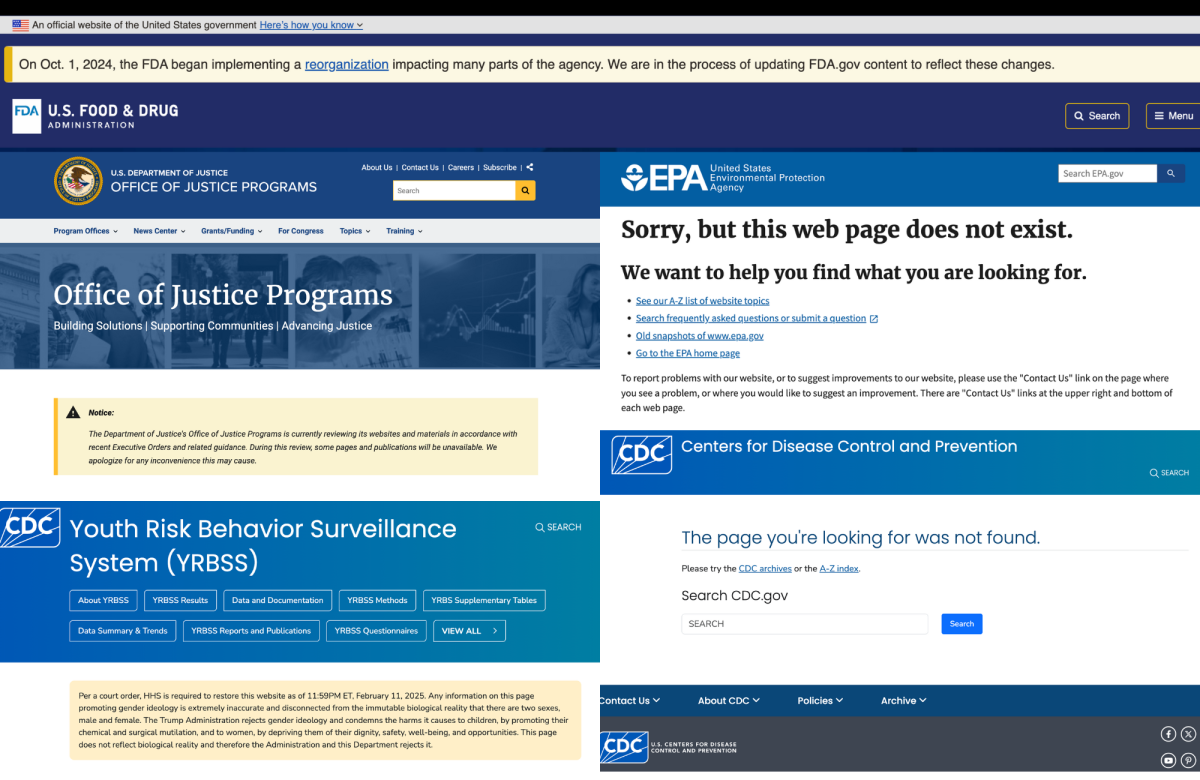Almost immediately after President Donald Trump entered office in January, he released executive orders intended to end diversity, equity and inclusion programs across the nation. Now, researchers are noticing the removal of certain datasets from government websites.
Most census data that the government removed was related to DEI, including the Centers for Disease Control and Prevention’s Youth Risk Behavior Surveillance System, EJScreen, and some data from the Department of Education’s website. Per a court order, YRBSS has been restored with a disclaimer that the CDC and Trump administration reject the content.
During the week of the inauguration, Feinberg Prof. Michelle Birkett said she noticed some datasets within her field — those relating to population health containing sexual orientation or gender identity — were disappearing.
“We need these datasets not just to do our work but to understand the health of the country and the state of the climate. The fact that they would go offline is just insane,” Birkett said. “Folks are feeling just destabilized.”
Third-year Ph.D. candidate Victoria Lang works at Northwestern’s Department of Earth, Environmental and Planetary Sciences to find solutions for climate change, specifically reducing emissions from the transportation sector.
Researchers in this field often use the Climate and Economic Justice Screening Tool — a dataset created during the Biden administration. The dataset contains geospatial information on how each U.S. territory is impacted by pollution. Lang said this dataset helped scientists come up with solutions to inequality caused by climate change.
Lang said she read a paper that involved CEJST published on Jan. 22, and the dataset was removed the following week. She said the dataset is crucial to resolving environmental inequity because it reveals the correlation between disadvantaged communities and the areas impacted by pollution.
“It wasn’t just scientists that relied on these datasets. It was policymakers, municipal leaders, stakeholders (and) the community groups themselves trying to advocate for improved, lived experiences,” Lang said.
There have been efforts to rescue these datasets from several organizations, such as the Data Rescue Project, which collects and preserves datasets at risk of redaction.
Lynda Kellam, secretary of IASSIST and an organizer within the Data Rescue Project, said the project initially started in 2017 when concerns of potential data deletion regarding climate change arose with the change in administration.
Kellam explained that while there has always been some loss of data after a change in administration, the level of “wholesale deletion or removal or redaction” under the Trump administration is unprecedented.
Nevertheless, interest in data restoration efforts seems to have gained momentum, Kellam said.
She said the project gained more than 2,000 followers on Bluesky and almost 500 people signed up to help out with the project.
Despite these efforts, there is a forthcoming challenge in preserving these datasets if reliance on individual volunteers continues.
“Yes, we have organizations and universities backing up the (datasets), but we’re not going to be developing it further,” Lang said. “These are going to be historical datasets that won’t be updated. It’s too large to keep on updating in a private manner.”
Both Kellam and Birkett pointed out that this shouldn’t be individuals’ work to do, as the datasets are supported by taxpayers. In addition, Birkett said that it’s a lot of manual work to restore the data.
“Why are we doing this? This shouldn’t be (our) work to do,” she said. “We paid for (these datasets).”
Kellam and Lang both said they hope to spread awareness about data deletions and the existence of archives, such as the Inter-university Consortium for Political and Social Research.
Looking into the future, Kellam also mentioned the importance of preventing the “politicization of data.” This is when the government brings the data down, takes out certain variables and puts them back up, Kellam added.
“We need these datasets to have a ground truth understanding of the way the world is,” Birkett said. “This is a really fundamental attack on what we do as scientists.”
Email: eunsoolee2027@u.northwestern.edu
Related Stories:
— NU Kellogg removes DEI Pathway amid Trump executive orders
— NU Feinberg scrubs DEI webpage amid Trump’s executive orders
— Northwestern Libraries’ website removes DEI mention as University responds to executive orders







